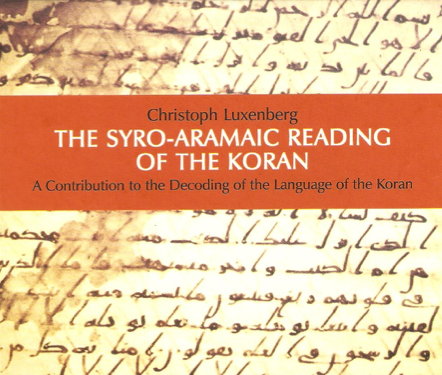
In the book The Syro-Aramaic Reading of the Koran: A Contribution to the Decoding of the Language of the Koran by the orientalist Christoph Luxenberg, it is clearly demonstrated that the grammatical structures found in the Qur'an are far more similar to the rules of the Syriac language than to the rules laid down by Sibawayh the Persian. Although Sibawayh developed Arabic grammar in the absence of a written grammar for the language, this does not at all mean that the Arabic language did not possess an oral grammar, something that was probably adapted from the mother tongue of Nabataean Syriac.
THE FACT THAT the orientalist researcher Christoph Luxenberg was able to explain many of the dilemmas thanks to his recourse to Nabataean grammar and the Nabataean language is fully consistent with the Syriac roots of Arabic, something which provides indications of there being a prevailing misunderstanding of the Qur’ān. The following are passages and examples from Luxenberg’s book.[1]
There is a simple word in the Qur’ān which the commentators eastern and western have hitherto been unable to explain. The word is قسورة qaswara. and is found in the text of Sūrat al-Muddaththir, verse 51:
What is then the matter with them, that they turn away from the admonition, as if they were asses taking fright and fleeing from a lion [qaswara]?
Arab commentators unanimously agreed that this word was Ethiopian in origin because of its exoticism from Arabic, and figured that it must indicate a lion because the ḥumr (i.e. asses) fled from it, after one of the commentators opined that the word for lion in Syriac is aryā, which indicates that some of them had knowledge of Syriac.
Then western commentators came along and delved into the origin of this expression, but did not find any derivation from Ethiopic. They therefore concluded that the term lion is as close they could get to a derivation for the origin of the Arabic قسـر qasr in the text, a word which actually means ‘forced’ or ‘obligated’, and so the true meaning of this expression simply remained obscure.
But the Qur’ānic spelling indicates a Syriac noun of the form ܦܥܘܠܐ pā‘ōlā from which the Arabic form فعول fa‘ūl or فاعول fā‘ūl derives. The word is in fact Syriac in origin and derived from the root ܩܣܪ qsr or ܩܨܪ qṣr (= Arabic قصر qaṣura ‘to be incapable’) as the Syriac dictionaries inform us. So we find this term formulated with the letters sīn and wāw and written as qūsra with the letter sīn or qūṣra with the letter ṣād – a Syriac form that does not differ in pronunciation from the words qūsrah and qūṣrah in other Aramaic dialects.
The compendious Lisān al-‘Arab dictionary mentions that the people of Basra referred to someone rejected as ‘Ibn Qawṣara’ (more correctly pronounced as qūṣrah or qūṣrā and indicating someone deficient or failing) and it quotes Ibn Durayd saying “I do not consider it Arabic even though it has long been in use”. This is itself something that gives further indication of how the Arabic and Syriac languages were intertwined. The Qur’ānic spelling قسوره is more correct in Syriac and is pronounced qāsōrā and not qaswara as the Cairo Qur’ān vocalises it. But the actual meaning, according to the testimony provided by Syriac, is an old decrepit ass that cannot carry any burden. The Qur’ānic passage thus may be explained in one of two ways:
- Fleeing from something fearful like a lion – something self-evident that justifies running away from it
- Fleeing from something that is not terrifying, such as a person scared of his own his imagination!
The latter is what the Qur’ānic text intends as it likens those who flee from the Qur’ān’s recitation to donkeys fleeing not only from an animal the same as them, but one that is decrepit to boot, one that has nothing to make you run away. This expression, which is faulty in Arabic, proves the Syriac origin of its pronunciation, its etymology and its meaning.[2]
Luxenberg points out that the Arab commentators understood the word قسورة qaswara / qāsōrā / to mean lion whereas in Syriac it means a decrepit donkey. They also read the Qur’ānic spelling ḥmārk as ḥimārik in the phrase وَانْظُرْ إِلَىٰ حِمَارِكَ And look at thine ass! (Sūrat al-Baqara,259), while the word in Syriac is intended as an adjective referring to human beings.
To illustrate this, we may refer to Luxenberg’s study where the subject of the above is that God caused a man who did not believe in the Resurrection to die and then resurrected him after a hundred years, saying to him:
Just look at thy food and drink which has not rotted! Look at thine ass! And, that We may make thee a token unto mankind, look at the bones, how We adjust them and then cover them with flesh! [3]
Before getting to the word ‘ass’ Luxenberg wonders what the Qur’ān could mean concerning a man who is resurrected a hundred years later, by referring to his food and drink, even though there is no connection to food or drink in this context. Since these two expressions cannot be understood in Arabic other than as eating and drinking, Luxenberg believes that they may be explained in the Qur’ānic text from the Syriac, in that the middle alif letter is generally added to the word in later Qur’ān codexes, Luxenberg reads the word understood as ‘food’ طعما as a Syriac word ܛܥܡܐ ṭa‘mā or ܛܥܡܬܐ ṭ‘amṯā meaning the ‘mind’, or ‘understanding’, (indicated in the colloquial expression of Syriac origin: حكى بلا طعمه ḥakī bilā ṭu‘ma ‘meaningless talk’), or ‘condition’, ‘matter’, ‘state’ or ‘property’.[4]
Since this meaning is identical to the Syriac expression ܫܪܒܟ sharbāḵ ‘state of affairs’, ‘circumstance’, ‘that which affects one’ and not the Arabic شرابك sharābak ‘your drink’, Luxenberg believes that these two words are two synonyms for one and the same thing, as confirmed by the following singular verb لَمْ يَتَسَنَّهْ lam yatasannah (‘has not rotted’) and he attributes this verb as well to a Syriac origin ܐܫܬܢܝ (eshtnī), which means ‘to change’ , ‘to alter’ as al-Ṭabarī explained the verse’s meaning. So the proper meaning is:
Look at your condition and your state: it has not changed!
Luxenberg explains that we have to understand the word spelled حمارك ḥimārika by reading it as the Syriac ܓܡܪܟ gmārāḵ[5] ‘thy perfection’, ‘thy completeness’ (one might note here that in Arabic there is the word ‘glow’, insofar as this denotes perfectly, or completely glowing coal. So Luxenberg reads the verse as follows:
Behold your perfection (or completeness)!
This gives a logical meaning to the above verse, unlike the reading that has been common since the vocalisation of the Qur’ān that proposed the sense of ‘thine ass’, which has no place in this Text. The evidence for this is that the Almighty subsequently goes on to say: that We may make thee a token unto mankind, and not that We may make thine ass a token unto mankind.

Suggested Reading
Finally, Luxenberg points out that the reading of نُنْشِزُهَا nunshizuhā (‘we set them together’) is wrong and should be read نُنْشِرهَا nunshiruhā (‘we restore them’) and supports this Arabic reading with the evidence of its Syriac synonym ܦܫܬ pshaṭ which means to ‘unfold’ or to ‘spread out’, or figuratively, to ‘make straight’, to ‘restore’, so that the meaning of the verse in its Arabic and Syriac reading is:
Look at your condition and your state: it has not changed! Behold your perfection! And therewith we make you an example for the people, and behold how we restore your bones and cover them anew with flesh!
[1] Christoph Luxenberg, The Syro-Aramaic Reading of the Koran: A Contribution to the Decoding of the Language of the Koran, Verlag Hans Schiler. For this work see the Almuslih Library, under the rubric: The Qur’ānic Vorlage Thesis. (Ed.)
[2] Luxenberg, Op. cit., pp.61-63.
[3] Luxenberg, Op. cit., pp.191, 195.
[4] Luxenberg, Op. cit., pp.192-3.
[5] Note that the pronunciation g and j are interchangeable in Arabic for the letter ج according to dialect, and there is only one diacritical dot separating the letter ح (ḥ) from ج (j) (Ed.)
